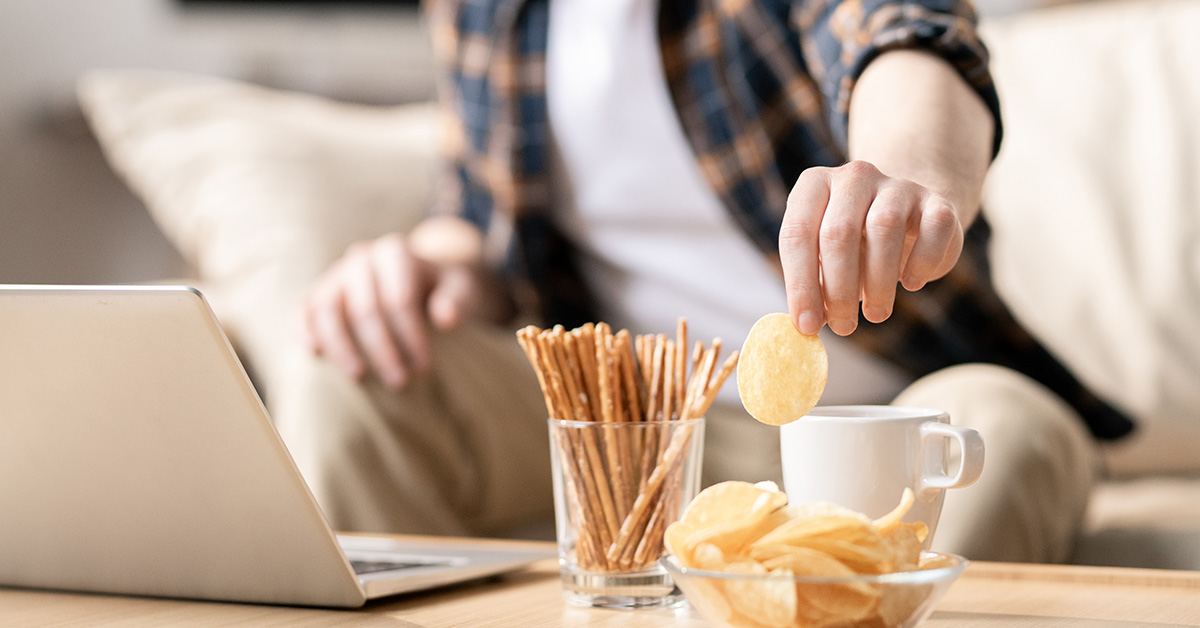Tips for Stopping Stress-Snacking
Stress-snacking plagues a lot of people. Stress affects our hormone balance, including our hunger and satiation signals. Snacking can lead to undesirable changes in your health, yet it can be difficult to stop emotional eating. Take steps now to disentangle your eating habits from your emotions.
Control Your Stress
Stress increases cortisol and depletes your body of nutrients it needs. It can drive you to consume larger quantities of quick-energy foods such as sugar, as if your body perceives that you are getting ready to fight a wild beast. Controlling stress may be easier said than done, but there are simple changes you may be able to make to head in the right direction:
- Get sufficient sleep and try to maintain a consistent bedtime schedule to put your circadian rhythm in balance. Insufficient or erratic sleep can disrupt the recovery time your brain needs for making sense of things you have experienced or helping you find solutions to problems you’re facing.
- Set aside time for self-care activities to give yourself a break from the constant drain of your intellectual, emotional and physical reserves. Self-care could be as simple as reading a book, learning to paint, taking a walk or any other activity you find enjoyable and stress-free.
- When your stress is induced by things that are presently outside of your control, consider picking up new hobbies, volunteer work or other activities. This can help keep your mind occupied on other matters and less weighed-down by the things you can’t change.
Identify Your Triggers
Learning to recognize the triggers that drive you to stress-snack may help you avoid those triggers or find healthier ways of working past them. Practice self-awareness, because awareness empowers you to make conscious choices.
When you reach for a bag of chips, what are you feeling right then? When you desperately crave a chocolate bar, was there some emotionally jarring event that took place not long before? Beginning to understand what drives you to eat may grant you the emotional eating help you need to differentiate between genuine hunger and need for food versus snacking as a result of stress, pain or loneliness.
Avoid Avoidance
As you begin to get a handle on what triggers you to turn to junk food, you may find that certain types of activities or tasks are particular culprits for you. These may be things like having to make a taxing call or tackle a particularly challenging project at work.
As such things weigh on you, they may interfere with other activities and responsibilities even on a subconscious level. You may find you have a tendency for avoidance, such as through eating instead of addressing the real problems in your life, which can lead to even higher stress and lower satisfaction.
Learn to face obstacles head on. Make the things you most dread your first priorities to resolve, rather than saving them for last. You may find that overcoming the worst of your obstacles first frees your mind from distraction and worry as you work through tasks you find easier to manage.
Stop Extreme Calorie-Restricting Diets
Extreme calorie restriction on an ongoing basis can put food at the forefront of your mind. It can become distracting, interfering with other responsibilities in your life. It can also lead to craving and binging on things you might otherwise have the willpower to avoid. Extreme calorie restriction may also be counterproductive to weight loss, if that’s one of your goals, because of the safety mechanisms the body switches on to reduce energy expenditures when facing extreme deficits.
Consider a more moderate approach if you want to shed some pounds. Even simple and easily accomplished changes to your diet may slowly lead to the improvements in your health and weight that you are looking for. Positive changes could include transitioning to:
- Minimally processed, home-prepared foods with plenty of variety
- Sufficient protein and fat to satiate hunger and provide sustained energy
- Limiting or eliminating sugars, sweeteners and other simple or refined carbs for more stable blood sugar
Learn To Cook Better
Another way to reduce the tendency to snack purely out of habit or stress is to improve your culinary skills. Learning the techniques that make professional chefs more efficient along with the fundamentals needed to tackle any recipe can improve your confidence in the kitchen.
If your skills in the kitchen are already pretty reasonable and you only need guidance, in particular, narrowly focused topics such as improving prep speed, a simple web search may be all you need to find the answer. When you need a broader range of training or a more structured series, online cooking courses may be the way to go. In either case, you will have the freedom to learn on your own schedule, at your own pace, and in an environment free from judgment.
Learning to take control of your diet through better home-prepared meals empowers you to understand your food choices and make conscious decisions. In taking back power, you may find that you default to low-quality foods less often and start to learn how to overcome emotional eating.
Keep Junk Food Out of Reach
keeping food within reach makes it too easy to grab a couple of this or a handful of that, finishing off whole bags, bowls or boxes of snacks or candy before you even consciously realize how much you were snacking. A dish of caramels or bag of chips right by your workstation or where you kick back to watch television puts temptation right under your nose.
If you plan to keep snacks in your home, make sure they are at least put away, far from your reach and out of sight. Preferably, store them someplace high up and behind other things, such as the back of the top cabinet, so that eating them would involve conscious decisions and actions.

Comentarios
Publicar un comentario